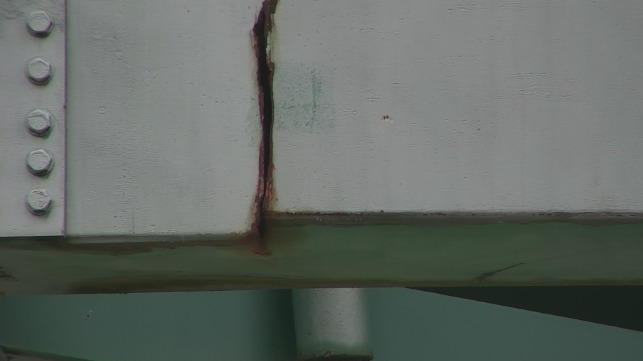Memphis Bridge Damage Could Take Eight Weeks to Repair
Hundreds of barges queue as Mississippi River remains closed near the bridge

The damage to the I-40 bridge over the Mississippi River at Memphis could take as long as two months to repair, according to the head engineer for Tennessee's transportation department - and that could have major implications for inland shipping.
On Tuesday, a contractor for the Arkansas Department of Transportation discovered a major crack in one of two beams that support the Tennessee-side span of the Hernando de Soto Bridge, a 47-year-old steel arch over the Mississippi.
Photos of the crack appear to show the two-foot-wide steel box beam broken nearly in half. Three out of the four plates that make up the beam have separated fully, according to the Tennessee Department of Transportation, and the final (bottom) plate is partly torn through.
After spotted the damage, the inspector placed an urgent call to 911, requesting assistance to "immediately" shut down the bridge and clear off all vehicles. The U.S. Coast Guard also closed the river to all vessel traffic near the bridge as a precautionary measure.
Transport impact
In one stroke, the I-40 bridge shutdown closed one of the region's most vital routes for long-distance trucking and the nation's most important inland waterway. As of Thursday, over 700 river barges and more than 40 vessels were in the queue on either side of the Coast Guard's navigation restriction zone, and the number is expected to grow.

that matters most
Get the latest maritime news delivered to your inbox daily.
The shutdown comes at a key time for inland waterway shipping: May is a peak season for shipments of corn from producers in the Midwest to export hubs near the mouth of the Mississippi. This season is busier than usual, with elevated demand for U.S. agricultural products on the global market and corn futures trading at prices well above the historical average.
Relief may not be immediate, according to Tennessee officials. "It will be a number of weeks at least until we can have a repair in place, probably six to eight weeks minimum," said Paul Degges, the chief engineer for the Tennessee Department of Transportation, speaking to CNN. "Hopefully, we can pull a rabbit out of a hat sooner, but public safety is most important."
